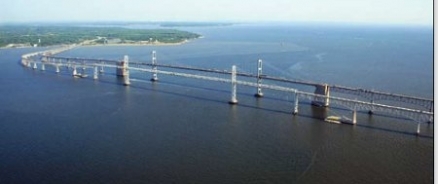Science for Chesapeake Bay Environmental Management
From The Encyclopedia of Earth
Environmental & Resource Management (main)
Source: U.S. Geological Survey
March 8, 2011, 12:00 am
March 8, 2011, 9:15 am
Synthesis of U.S. Geological Survey Science for the
Chesapeake Bay Ecosystem and Implications for Environmental Management
USGS report provides new insights about the challenges
of restoring the Chesapeake Bay ecosystem.
The report summarizes USGS science about the multiple factors affecting the degradation of the Chesapeake Bay ecosystem and provides summaries of:
- Population growth and land-use change;
- Nutrient distribution, transport, and changes in the watershed,
- Sediment sources and transport in the watershed and estuary;
- Pesticide occurrence in the watershed and contaminant impacts on wildlife;
- Climate change and its impact on water quality, and habitat;
- Estuary habitats (submerged aquatic vegetation and wetlands),
- Factors affecting fish health; and
- Changes in food and habitats of waterbirds.
Each chapter provides a 2-4 page synthesis of the USGS scientific findings from 2001-2006, their management implications, and supporting references for readers wanting more in-depth information. The findings have also been summarized for each of the major restoration activities of the Chesapeake Bay Program.
The synthesis was used to also refine future USGS Chesapeake Bay Science Topics, which include addressing:
